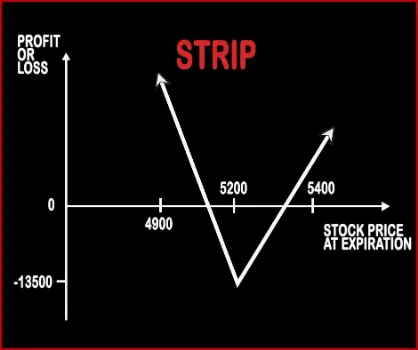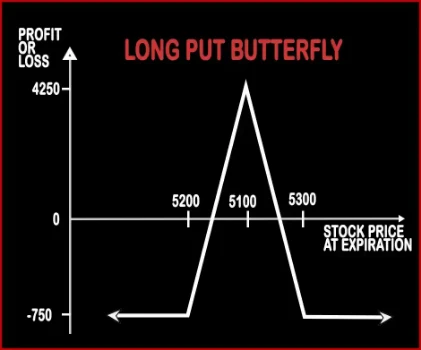Compare Strategies
| STRIP | LONG PUT BUTTERFLY | |
|---|---|---|

|

|
|
| About Strategy |
Strip Option StrategyStrip Strategy is the opposite of Strap Strategy. When a trader is bearish on the market and bullish on volatility then he will implement this strategy by buying two ATM Put Options & one ATM Call Option, of the same strike price, expiry date & underlying asset. If the prices move downwards then this strategy will make more profits compared to short straddle because of the |
Long Put Butterfly Option StrategyThe Long Put Butterfly is a neutral strategy where a trader will be bearish on the volatility i.e. he thinks the market will have sideways kind of movement and will not rally sharply in either direction in the near future. This strategy involves sale of 2 ATM Put Options, buy 1 ITM and 1 OTM Put Option. The risk and reward are limited. |
STRIP Vs LONG PUT BUTTERFLY - Details
| STRIP | LONG PUT BUTTERFLY | |
|---|---|---|
| Market View | Neutral | Neutral |
| Type (CE/PE) | CE (Call Option) + PE (Put Option) | PE (Put Option) |
| Number Of Positions | 3 | 4 |
| Strategy Level | Beginners | Advance |
| Reward Profile | Unlimited | Limited |
| Risk Profile | Limited | Limited |
| Breakeven Point | Upper Breakeven Point = Strike Price of Calls/Puts + Net Premium Paid, Lower Breakeven Point = Strike Price of Calls/Puts - (Net Premium Paid/2) | Upper Breakeven Point = Strike Price of Highest Strike Long Put - Net Premium Paid, Lower Breakeven Point = Strike Price of Lowest Strike Long Put + Net Premium Paid |
STRIP Vs LONG PUT BUTTERFLY - When & How to use ?
| STRIP | LONG PUT BUTTERFLY | |
|---|---|---|
| Market View | Neutral | Neutral |
| When to use? | When a trader is bearish on the market and bullish on volatility then he will implement this strategy. | The Long Put Butterfly is a neutral strategy where a trader will be bearish on the volatility i.e. he thinks the market will have sideways kind of movement and will not rally sharply in either direction in the near future. |
| Action | Buy 1 ATM Call, Buy 2 ATM Puts | Buy 1 OTM Put, Sell 2 ATM Puts, Buy 1 ITM Put |
| Breakeven Point | Upper Breakeven Point = Strike Price of Calls/Puts + Net Premium Paid, Lower Breakeven Point = Strike Price of Calls/Puts - (Net Premium Paid/2) | Upper Breakeven Point = Strike Price of Highest Strike Long Put - Net Premium Paid, Lower Breakeven Point = Strike Price of Lowest Strike Long Put + Net Premium Paid |
STRIP Vs LONG PUT BUTTERFLY - Risk & Reward
| STRIP | LONG PUT BUTTERFLY | |
|---|---|---|
| Maximum Profit Scenario | Price of Underlying - Strike Price of Calls - Net Premium Paid OR 2 x (Strike Price of Puts - Price of Underlying) - Net Premium Paid | Strike Price of Higher Strike Long Put - Strike Price of Short Put - Net Premium Paid - Commissions Paid |
| Maximum Loss Scenario | Net Premium Paid + Commissions Paid | When Price of Underlying <= Strike Price of Lower Strike Long Put OR Price of Underlying >= Strike Price of Higher Strike Long Put |
| Risk | Limited | Limited |
| Reward | Unlimited | Limited |
STRIP Vs LONG PUT BUTTERFLY - Strategy Pros & Cons
| STRIP | LONG PUT BUTTERFLY | |
|---|---|---|
| Similar Strategies | Strap, Short Put Ladder | Iron Condors, Iron Butterfly |
| Disadvantage | Expensive., The share price must change significantly to generate profit., High Bid/Offer spread can have a negative influence on the position. | • Risk is higher than reward. • When the underlying price is in between the two breakeven points, time decay hurts the position. |
| Advantages | Profit is generated when the share price changes in any direction., Limited loss., The profit is potentially unlimited when share prices are moving. | • Limited maximum loss. • Unlimited profit potential, risk only limited to loss of premium. • Benefits from low volatility. |